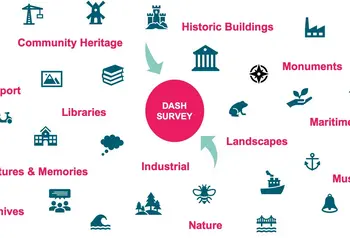Results from the first UK-wide survey of digital in heritage
DASH report 2020
This new report, published 14 October 2020, brings together the responses of 4,120 staff, trustees and volunteers working at 281 heritage organisations across the UK who completed our DASH survey.
Its findings provide a fascinating insight into the digital attitudes and skills of people working and volunteering in the sector today.
Using the data, the report’s authors, Timmus Research Limited, offer a series of recommendations to help heritage organisations get to grips with digital and use it to drive resilience, innovation and enterprise. There’s lots of learning for us as a funder, too.
Download the full report at the top of the page.

Two quick insights
Josie Fraser, Head of Digital Policy at The National Lottery Heritage Fund, said: “The report shows that heritage is fundamentally about people and culture. During lockdown, the role that digital can play to support that has become even more important for organisations to understand.”
We have highlighted two key takeaways from the report below.
Speak to people about their needs
The report highlights how employees, trustees and volunteers have different barriers, motivations and needs when it comes to digital.
“46% of volunteers say that they never discuss their digital skills with others”
For example, the report describes how “Trustees often want to enhance organisational (digital) strategy; volunteers are often motivated by improving the visitor experience; and staff want to be more digitally enabled and effective in their specific context.”
It’s therefore important for an organisation to speak to its people before embarking on a digital strategy.
“46% of volunteers say that they never discuss their digital skills with others”
A skills audit can help an organisation identify its strengths, understand needs, set goals and manage expectations. The DASH survey is still available to download for this purpose.
Speaking to staff and volunteers – including during recruitment and appraisals – can also help organisations identify untapped digital skills.
Think beyond training and resources
Many survey takers said they wanted support for their digital practice that was not related to training or resources.
“Only one in six heritage sector staff get the chance to share their digital practice with others.”
They wanted time to practise digital skills, mentoring from experienced colleagues and the opportunity to swap skills and collaborate with others.
Within an organisation, digital champions could be put to use to understand, support and empower fellow trustees and staff, tailoring their responses to specific needs. New volunteering opportunities that focus on digital could also be created.
“They wanted time to practise digital skills, mentoring from experienced colleagues and the opportunity to swap skills and collaborate with others.”
Outside of it, new networks could be key: “the heritage sector might benefit more from the creation of sub-sector and/or regional communities of practice that recognise and support a wide variety of different skills.”
Find out more
Find out much more about the digital attitudes and skills of staff, trustees and volunteers by dipping into the full report.
Who is the report for?
This report and its recommendations will be interesting to everyone working in the sector, but they are essential reading for leaders and board members – those who can create the space for digital to happen.
One of its key recommendations is that leaders create a digital strategy or action plan. “This need not be a long, formal process. In fact, better if it is a living document focused on small, achievable steps that can be updated as you move forward.”
Our response
We will use the report findings to guide our Digital Skills for Heritage initiative, designed to raise digital skills and confidence across the sector. Training and resources are already available, including responses to several areas of need identified through the DASH survey.
The next stage of our work will focus on using digital to increase enterprise and resilience, including through the creation of networks of practice as recommended in this report. Details will be announced soon.


